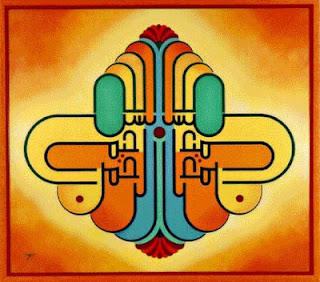Muharram is the month with which the Muslims begin their lunar Hijrah Calendar. It is one of the four sanctified months about which the Holy Qur'an says,
"The number of the months according to Allah is twelve months (mentioned) in the Book of Allah on the day in which He created heavens and the earth. Among these (twelve months) there are four sanctified".
These four months, according to the authentic traditions are the months of Zulqa'dah, Zulhijjah, Muharram and Rajab. All the commentators of the Holy Qur'an are unanimous on this point, because the Holy Prophet(sallallahu alaiyhi wassallam) in his sermon on the occasion of his last Hajj, has declared:
"One year consists of twelve months, of which four are sanctified months, three of them are in sequence; Zulqa'dah, Zulhijjah, Muharram, and the fourth is Rajab."
The specific mention of these four months does not mean that any other month has no sanctity, because the month of Ramadhan is admittedly the most sanctified month in the year. But these four months were specifically termed as sanctified months for the simple reason that their sanctity was accepted even by the pagans of Makkah.
In fact, every month, out of the twelve, is originally equal to the other, and there is no inherent sanctity which may be attributed to one of them in comparison to other months. When Allah Almighty chooses a particular time for His special blessings, then it acquires sanctity out of His grace.
Thus, the sanctity of these four months was recognized right from the days of Sayyidina Ibrahim(A.S.) . Since the Pagans of Makkah attributed themselves to Sayyidina Ibrahim(A.S.) they observed the sanctity of these four months and despite their frequent tribal battles, they held it unlawful to fight in these months.
In the Shari'ah of our Holy Prophet (Sallallahu Alaihi Wassallam) the sanctity of these months was upheld and the Holy Qur'an referred to them as the "sanctified months".
The month of Muharram has certain other characteristics peculiar to it which are specified below.
1. Fasting during the month
The Holy Prophet(sallallahu alaiyhi wassallam) has said:
"The best fasts after the fasts of Ramadhan are those of the month of Muharram."
Although the fasts of the month of Muharram are not obligatory, yet, the one who fasts in these days out of his own will and choice is entitled to a great reward by Allah Almighty. The Hadith cited above signifies that the fasts of the month of Muharram are most reward-able ones among the Nafl fasts i.e. the fasts one observes out of his own choice without being obligatory on him.
2. The day of ''Ashurah'
Although the month of Muharram is a sanctified month as a whole, yet, the 10th day of Muharram is the most sacred among all its days. The day is named ''Ashurah'.
According to the Holy companion Ibn 'Abbas(R.A.) . The Holy Prophet (sallallahu alaiyhi wassallam) , when migrated to Madinah, found that the Jews of Madinah used to fast on the 10th day of Muharram. They said that it was the day on which the Holy Prophet Musa (Moses) (A.S.) and his followers crossed the Red Sea miraculously and the Pharaoh was drowned in its water. On hearing this from the Jews, the Holy Prophet(sallallahu alaiyhi wassallam) ' said, "We are more closely related to Musa than you" and directed the Muslims to fast on the day of ''Ashurah. (Abu Dawood)
It is also reported in a number of authentic traditions that in the beginning, fasting on the day of ''Ashurah was obligatory for the Muslims. It was later that the fasts of Ramadhan were made obligatory and the fast on the day of ''Ashurah was made optional. Sayyidah 'A'ishah(R.A.) has said:
"When the Holy Prophet (Sallallaho Alaihi Wassallam) came to Madinah, he fasted on the day of ''Ashurahh and directed the people to fast it. But when the fasts of Ramadhan were made obligatory, the obligation of fasting was confined to Ramadhan and the obligatory nature of the fast of 'Ashurah was abandoned. One can fast on this day, if he so wills, or can avoid fasting, if he so wills.".
This is the day in which Adam(A.S.) was created.
This is the day in which Ibrahim(A.S.) was born.
This is the day in which Allah accepted the repentance of Sayyidina Ibrahim(A.S.).
This is the day on which the Qiyamah (dooms-day) will take place.
Whoever takes bath in the day of ''Ashurah will never get ill.
By,
Mufti Muhammad Taqi Uthmaani






